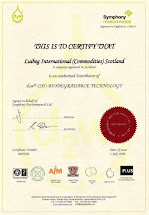Wednesday, 5 December 2012
Tuesday, 4 December 2012
This
article courtesy: www.daijiworld.com
Seminar
Clears Misconceptions About Plastic
Mangalore,
Oct 5
A
presentation by Goldwin Fernandes on plastics (confining to polyolefin's, PE and
PP) in comparison with other packaging material at the City Corporation, was
held here on Thursday October 4, in the presence of the MCC environmental engineer
Manjunath Shetty , pollution control officer Laxman and the task force.
Addressing
the MCC officers, Fernandes explained and clarified certain facts and
misconceptions about conventional plastic before moving on to biodegradable
plastic and its comparison with paper bags, non-woven PP and cloth bags.
Generally
the negatives of plastic bags are highlighted and compared with positives of
paper bags and cloth. But Fernandes put forward facts, figures and scientific
proof on how the positives of using plastic bags, especially environment
friendly oxo- biodegradable and compostable plastic bags outweigh the positives
of using paper bags or cloth bags.
Many
life cycle analyses of plastic bags in comparison with other materials were
cited. The presentation showed that resources used and emissions generated for
the manufacture of plastic bags were far less as compared to the manufacture of
other materials. Plastics are also safer, cheaper and more economical than
paper bags. Plastics are safe for use in agriculture, medicine and food
industry as they are certified food grade as per Indian standards
specifications.
He
showed as per Boustead report that if all plastic bags were replaced by paper
bags there would be a drastic increase in greenhouse gases and environment
pollution. Speaking on biodegradable plastic he said that the two main
biodegradable plastics used are oxo-biodegradable which are to be tested as per
ASTM D6954-04 and compostable (hydro-biodegradable) as per ASTM D6400. He said
both these are certified and proven.
He
said that service life of the bag can be set for oxo-biodegradable after which
it will degrade and biodegrade leaving no harmful residue. The degraded
fragments are not plastic but are like materials similar to natures waste and
nature's processes act on it and biodegrade them. Oxo-biodegradable material is
safe for contact with food.
Fernandes said that fermenting corn or sugarcane
gives lactic acid which when polymerized gives PLA which is used in the
manufacture of compostable bags .The life of the bags is about one year and it is
fully compostable.
During
the general interaction the pollution control showed the test report which was
received from CIPET. It showed that the non-woven bags which were being
passed off as cloth bags were in fact plastic bags made of polypropylene. The
recent 2011 LCA published by the UK government's environment agency has
indicated that global warming generated by this specific material non-woven PP
bag is much more than that of a conventional plastic bag and not environment
friendly. He pointed out that polyolefin's are a different category of plastics
and are safe for the environment and for food contact, but due to
misinformation considered hazardous.
Subscribe to:
Comments (Atom)
















































